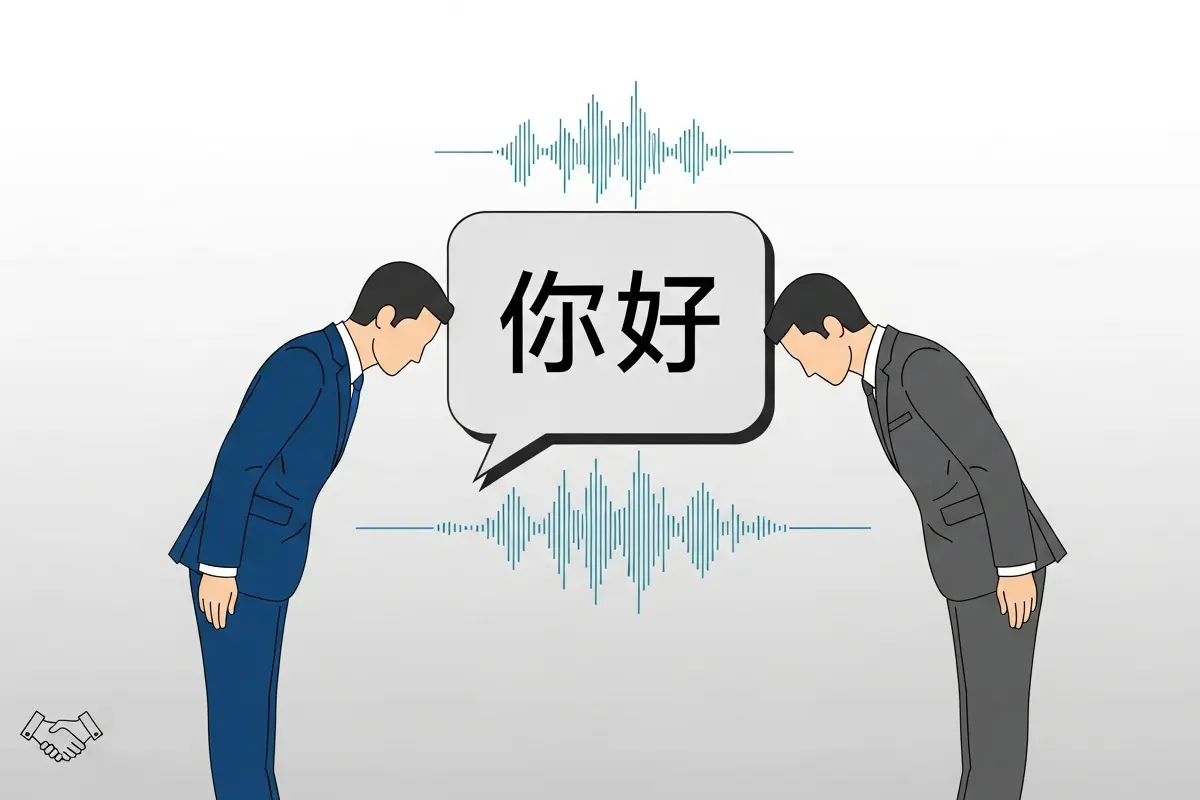
TL;DR — Quick Summary
- Use 您好 (nín hǎo) for formal greetings in professional settings.
- Say 早上好 (zǎoshang hǎo) for “Good morning” in business meetings.
- 久仰 (jiǔyǎng) expresses respect when meeting someone for the first time.
- Avoid overly casual greetings like 嗨 (hāi) in professional contexts.
- Business etiquette values politeness, hierarchy, and cultural awareness.
The Polite Way to Say Hello in Chinese Business Settings
The most common and formal way to say hello in Chinese for business is 您好 (nín hǎo) — the respectful form of “hello.”
Unlike everyday 你好 (nǐ hǎo), 您 (nín) is the polite second-person pronoun signaling deference to clients, seniors, or older people (see the overview of Chinese honorifics and the Mandarin pronoun table for 您). [Chinese honorifics, Chinese pronouns]
Use 您好 to open calls, greet a guest in the lobby, or start a formal introduction:
- “您好,张先生 (nín hǎo, Zhāng xiānsheng)” — Hello, Mr. Zhang.
- Meeting room entrance: brief nod + “各位领导您好” — Hello, respected leaders.
For a detailed comparison between 你好 (nǐ hǎo) and other casual greetings, check our guide on how to say hello in Chinese.
Essential Business Greetings in Mandarin
1. 您好 (nín hǎo) — Polite “Hello”
Used with clients, bosses, or business partners.
Example: “您好!欢迎光临我们的公司。” — Hello! Welcome to our company.
Takeaway: 您好 is the safest, most professional opener.
2. 早上好 (zǎoshang hǎo) — Good Morning
Great for conferences or morning briefings.
Example: “早上好,各位同事。” — Good morning, everyone.
Takeaway: Pair with titles for extra respect (e.g., 李总/王经理).
3. 下午好 (xiàwǔ hǎo) — Good Afternoon
Polite for midday meetings or presentations.
Example: “下午好,我是市场部的王经理。” — Good afternoon, I’m Manager Wang.
Takeaway: Neutral and professional across industries.
4. 晚上好 (wǎnshang hǎo) — Good Evening
Useful for receptions and banquets.
Example: “晚上好,感谢您参加今晚的活动。” — Good evening, thank you for joining tonight’s event.
Takeaway: Appropriate for formal hospitality.
5. 久仰 (jiǔyǎng) — “I’ve Heard So Much About You”
A respectful, high-register phrase for first meetings.
Example: “久仰大名。” — I’ve long admired your reputation.
How to Greet in Business Emails and Messages
Email greetings follow the same etiquette priorities: respect and clarity.
| Context | Example Greeting | Translation |
|---|---|---|
| Formal letter | 尊敬的李总,您好 | Respected Mr. Li, hello |
| Neutral business tone | 您好!我是王经理。 | Hello! I’m Manager Wang. |
| Follow-up email | 李经理,您好!感谢您上次的会议。 | Hello Mr. Li! Thank you for the previous meeting. |
Pro Tip: Start with title + surname (e.g., 王经理/李总) and close with a courteous line like “顺祝商祺” (wishing you success in business).
Business Greeting Etiquette in China
Chinese business settings reward politeness, hierarchy, and modesty:
- Titles first: Address by title + surname (王经理, 李总).
- Two-handed exchange: Offer/receive business cards with both hands — a widely taught best practice in business-Chinese curricula.
- Hands + greeting: A light handshake followed by 您好 is standard.
- Let seniors lead: Allow senior counterparts to initiate seating and small talk.
Linguistically, the polite pronoun 您 is a core marker of respect in contemporary Mandarin, documented in reference grammars and pronoun tables. [Chinese pronouns]
Useful Expressions Beyond “Hello”
Keep conversations smooth after the greeting:
| Expression | Pinyin | Meaning | Usage |
|---|---|---|---|
| 幸会 | xìng huì | Nice to meet you | First-time introductions |
| 请多关照 | qǐng duō guānzhào | Please take care of me | Humble request, new partnerships |
| 初次见面,请多指教 | chū cì jiàn miàn, qǐng duō zhǐ jiào | It’s my first time meeting you; please guide me | Formal introductions |
| 久违了 | jiǔ wéi le | It’s been a long time | Professional reconnections |
| 欢迎光临 | huān yíng guāng lín | Welcome | Hosting clients/guests |
When to Use Informal Greetings (and When Not To)
For equal-rank colleagues in casual environments, you can relax slightly:
- 你好 (nǐ hǎo) — neutral “hello.”
- 嗨 (hāi) — “hi,” common in startups or creative teams.
- 早 (zǎo) — short morning greeting.
But for first meetings, clients, or senior leadership, stick with 您好 or 久仰 for a professional tone backed by honorific usage norms.
To explore how everyday phrases like “How are you?” differ from business Chinese greetings, see our post on how to say ‘How are you?’ in Mandarin.
Regional and Cultural Variations
- Mainland China: 您好 is universal for formal contexts.
- Taiwan & Hong Kong: Formal Mandarin coexists with local usage; English + Mandarin greetings are common in finance and hospitality.
- Singapore & Malaysia: Codeswitching is frequent; polite Mandarin greetings paired with English (“Good morning, 您好”) show cross-cultural respect.
Quick Reference Table: Chinese Business Greetings
| English | Chinese | Pinyin | Formality | Use Case |
|---|---|---|---|---|
| Hello | 您好 | nín hǎo | High | Introductions, client greetings |
| Good morning | 早上好 | zǎoshang hǎo | Medium | Meetings, emails |
| Good afternoon | 下午好 | xiàwǔ hǎo | Medium | Presentations |
| Good evening | 晚上好 | wǎnshang hǎo | Medium | Receptions, banquets |
| Honored to meet you | 久仰 | jiǔyǎng | High | First meeting |
| Nice to meet you | 幸会 | xìng huì | High | Networking |
Contextual Reading on Avatalks
To deepen your professional Mandarin, these background pieces help you parse written forms and core vocabulary:
- How writing systems evolved: Origin and Evolution of Chinese Characters
- Script choices by region: Difference Between Traditional and Simplified Chinese
- Core literacy boost: Most Common Chinese Characters for Beginners
- Function word spotlight: “And” in Chinese Characters (和, 与, 跟 Explained)